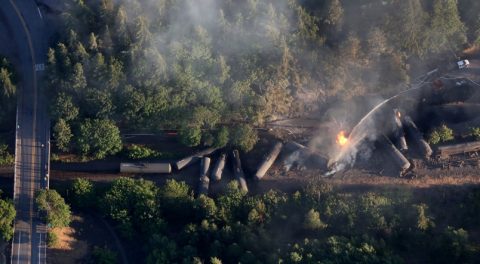
It's been less than a week since eleven cars from a 96-car Union Pacific train derailed in a National Scenic Area next to the iconic Columbia River (less than 0.13 miles away), and trains are already rolling on down the line, right through the middle of the cleanup operation and just feet from the derailed and destroyed cars. Hopefully this incident will serve as a serious wake up call to the general public and decision makers who'll be deciding the fate of proposed future oil export terminals in the PNW.
 Ariel view of derailed oil tank cars in Mosier, OR. Photo Credit: Alan Berner/The Seattle Times via AP
Ariel view of derailed oil tank cars in Mosier, OR. Photo Credit: Alan Berner/The Seattle Times via AP
Thankfully, Oregon leaders are taking a step in the right direction and calling for a moratorium on oil train transport in the Gorge. “It is too soon to resume oil train traffic through the Columbia River Gorge. Union Pacific should not resume oil train traffic before meeting with the community of Mosier and giving a thorough explanation for the cause of this accident and an assurance that the company is taking the necessary steps to prevent another one,” said Oregon Senators Ron Wyden and Jeff Merkley, Governor Kate Brown, and Representatives Earl Blumenauer and Suzanne Bonamici in a statement. While this is a good start and perhaps symbolic of a tidal shift, more lasting protections are needed, especially since there are major oil-by-rail expansion projects on the table. If approved, the proposed Tesoro Savage terminal in Vancouver, WA would be the largest crude-by-rail export terminal in the entire country, moving more than 360,000 barrels (or more than 15 million gallons) of crude oil PER DAY by rail down the Columbia River. Read more about the dangers and Surfrider's opposition to that project here.
Oil and Water Don't Mix - We Got "Lucky"
Last week's derailment could have been worse in so many ways. A snapshot from Google Earth shows that had the train derailed less than half a mile further down the track, it would have likely sent rail cars directly into the Columbia River, right during spring Chinook season. Moiser is located upstream of the Bonneville Dam where, according to a recently released report from the Washington Attorney Generals Office, is the worst place for a train derailment and spill because any oil that reaches the dam would be mixed by the turbines making remediation efforts much more challenging and costly. While some oil has indeed hit the Columbia, reports so far suggest that it is a relatively small amount. We may not be so "lucky" next time.
Watch Out - It Blows Here!
"Say no to 5.0" is an old windsurfing colloquialism in the Gorge that refers to only sailing when it's blowing so hard you need a sail smaller than 5 meters in size. This time of year, average wind speeds are approximately 35 mph, which is why kiteboarders and windsurfers from all over the world make the trek to recreate in this windblown wonderland (read: a recreation economy worth protecting)!
Fortunately, due to an unusually early heat wave and high pressure system, conditions on June 3rd were downright "glassy" - surf slang for there being little to no wind. Had the normal prevailing westerly winds been blowing, the flames from the burning cars would have been blown backwards on the remaining derailed cars, potentially causing more to explore or spreading the fire deeper into the town of Moiser and into the foothills of the Cascades. This is a situation local first responders all along the Gorge are not prepared for and what Moiser Fire Chief described as a potential "catastrophe".
 Exploding rail car - June 3rd in Mosier, OR. Photo Credit: KATU
Exploding rail car - June 3rd in Mosier, OR. Photo Credit: KATU
The Surfrider Perspective
The Columbia River Gorge, other Pacific Northwest waterways and our coastlines are outstanding public resources that provide enormous ecological, recreational, and socioeconomic values to communities and the region as a whole. These special places are the life line of the Pacific Northwest. They are the reasons why so many of us want to live here and protecting them is what fuels the passion of our chapter network. The draft environmental impact statement (DEIS) for the proposed Tesoro Savage facility in Vancouver indicated that train derailments resulting in a spill are expected on average every 2 years, and large ocean-going vessel groundings or collisions resulting in a spill every 20 years. Subjecting such important resources to such risk is absolutely unacceptable, especially given the persistent challenging weather conditions of strong winds in the Columbia River Gorge and frequent high surf (often 30-40ft+) along the Oregon and Washington coastlines.
Surfrider believes that instead of developing new fossil fuel extraction and transportation projects, we should seek a comprehensive and environmentally sustainable energy plan that includes energy conservation.
For the latest on what's happening with the proposed oil terminals and how to help protect the places that you love, keep tabs on the Oregon and Washington regional websites and get involved with your local chapter.




